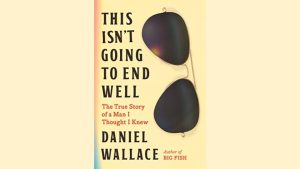In This Isn’t Going to End Well: The True Story of a Man I Thought I Knew, Daniel Wallace explores his relationship with his brother-in-law, and the effects that his suicide had on his family. Published in April, the New York Times calls it “eulogy, a cautionary tale, a love letter and a sob of anger.”
Prof. Wallace talks about the influence of William Nealy, his older sister’s husband, on his life, in stunning prose that addresses the beauty and pain of knowing and losing someone.
He writes, “It was lucky for me to have met him when I did. He was the one who would give me the idea for the life I ended up living, even if what I ended up doing was nothing like him or what he did. He showed me how it was done: experience, imagine, then create. Every book I’ve written is dedicated to him in invisible ink. I doubt I would have written a one of them without him, or that I would ever have considered being an artist at all” (8-9)
In his author’s note, Prof. Wallace notes that he was not trying to solve his brother-in-law’s suicide or find comfort, but “to try and understand him and tell his story the best I could.” There, he includes the National Suicide Prevention Lifeline number, (800) 273-8255, the three-digit code, 988, and the text line, 741741.
Continue reading to learn more about Prof Wallace’s writing process:
How would you describe your approach to writing?
I’m not a planner; that means I don’t know what I’m going to write before I write it. It’s improvisational, and surprising, the same way it should be for a reader coming to my work for the first time. So I try to come to it with an open mind, a blank slate, and let the information I get from the first sentence lead me to the second, and so on for hundreds of pages. The second approach, and one that’s equally if not more important, is to put in the hours necessary for the production of a story or a book. It’s work. It’s showing up. And of course there’s revision, which is never-ending.
What is your favorite part of being a writer?
My favorite part of being a writer is that, when I’m lucky, I fall into a spell, immerse myself into my work so deeply I have no idea how much time has passed as the story unfolds. I’m not in this world, I’m in the one I’m creating as I go. Even with a book of non-fiction, which distinguishes itself from fiction solely by being true, or factual, it’s still a story. It still has to be engaging. The other favorite part is that, when I’m successful, I move a reader the same way I was moved. It’s something we share.
What did you learn when writing the book?
I learn something from every book, but this one more than any of the others. This is especially interesting in that it’s non-fiction. I thought I knew everyone in the book; I thought I knew myself. But I don’t think it’s possible to understand life, to understand yourself, without the clarifying tool we all have at our disposal: words. Our minds are a swampy morass of experience and complicated feelings: how are you supposed to make sense of it all if that’s the only place where our experience and ideas reside? Every book is a detective story, but This Isn’t Going to End Well really is. I was the detective, but I was also the quarry.


